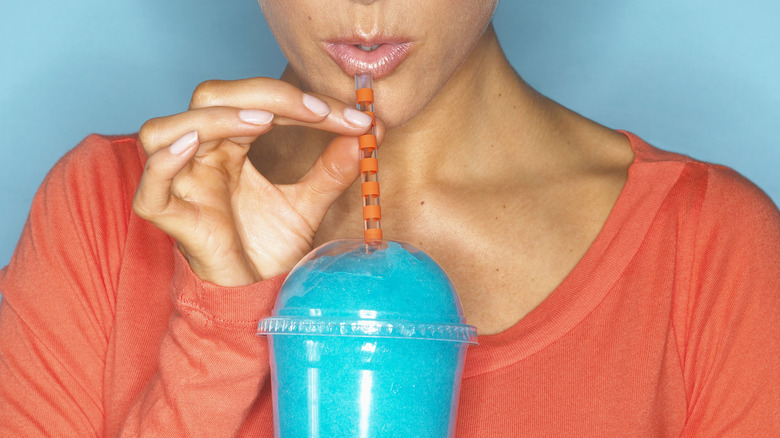We're Not Falling For WaterTok's Diet Culture In Disguise
A hydrated body is a healthy body, but you already knew that. Most, if not all of us, were indoctrinated into the eight-glasses-per-day rule as kids since water is integral to our overall well-being. When adequately hydrated, our bodies are better equipped to carry out essential functions, including processing and digesting food, regulating temperature, maintaining healthy skin, lubricating joints, eliminating waste, and more.
While there are studies suggesting we don't really need eight glasses of water a day, and our H20 requirement largely hinges on factors like our size and weight, where we live, and our daily routine, many still find the very act of drinking water laborious. Dr. Ava Williams, a board-certified Primary Care doctor, explained that it's because many find water, well, boring. "It's bland and tasteless," she told A Sweat Life. "Unlike food, there is no instant gratification from drinking water." To make chugging water less of a chore, Williams suggests adding chunks of fruit like orange, lemon, and cucumber, as not only will it make your drinking experience more enjoyable, but it will also infuse added nutrients to the otherwise insipid beverage.
Enhancing drinks with fruity components is nothing new, but in recent months, there's been a growing trend on TikTok called #WaterTok where people add supposedly sugar-free powders and syrups to concoct "water" that's much more fun to drink. Most #WaterTokers claim it to be an effective hack for reaching their hydration goals, but according to experts, it's not what it seems. Even worse, it could be subtly promoting diet culture. To get more insight on the possible safety concerns, Women.com spoke exclusively to registered dietitian nutritionist and certified intuitive eating counselor, Kathleen Meehan, MS, RD, LD.
#WaterTok, explained
To fully wrap your head around the bizarre phenomenon that is #WaterTok, it's essential to get to the root of it first. While pretty much anyone can jump on the bandwagon these days, the first proponents of the trend are actually bariatric patients looking for ways to increase their water consumption. Jeff Stanley, an obesity medicine specialist, told Forbes that these patients are encouraged to consume more liquid to "lose a little bit of weight before the surgery" and "shrink the liver a little, which makes the surgery easier." Registered dietitian Vanessa Rissetto also pointed out to Healthline that post-surgery, bariatric patients are advised to continue managing their water intake since the procedure alters their "stomach functionality."
The smattering of hacks involved in making water more palatable was initially contained within that community, but it's quickly become mainstream and has since been embraced by folks looking to improve their hydration. Kathleen Meehan, MS, RD, LDN, registered dietitian nutritionist and certified intuitive eating counselor, exclusively told Women.com that there's nothing inherently wrong with doing this. "There is no harm in flavoring water if it's something people enjoy and find that it helps increase hydration," she said.
Consuming flavored the likes of "peach ring water" or "pina colada water" only becomes a threat to one's health if it's done under the guise of suppressing the appetite and achieving weight loss, which, unfortunately, a lot of people already do. While many #WaterTok adherents swear by doctoring their water to get themselves to drink more, a subset of them do it to curb their cravings and eat less.
#WaterTok may not be all about hydration
In every ten #WaterTok entries, there seem to be one or two posts that have the hashtag #weightloss, or at least associate drinking flavored water with dropping pounds. There are people that claim to have abandoned consuming tea and soda altogether in favor of "water recipes," which helped them reach their weight loss goals. Unfortunately, these anecdotes only contribute to diet culture as they help perpetuate the dangerous idea that flavored water can function as an appetite suppressant or, worse, a suitable meal replacement.
"Anytime we are trying to avoid responding to hunger cues or cravings, we increase distrust within our body," explained Kathleen Meehan. "Avoiding food by drinking water is absolutely related to our diet culture. Promoting tricks and tips to suppress appetite is also promoting and normalizing disordered eating." She also noted that making it a habit can lead to adverse effects on one's physical and mental health. "Responding to hunger cues with water is harmful — any time we engage in restriction we are more likely to experience a distressing relationship with food," she added. "Drinking water when we should be eating food disconnects us from hunger cues, can challenge mental health, and can lead to inadequate nutrition."
Sure, #WaterTok may be a viable option for some, but for many others, it can be borderline dangerous, especially when not done in moderation. "A once-in-a-while cotton candy drink can be a fun change from plain water. But drinking it all day, every day, may not be the best idea when focusing on overall health," dietitian Laura Manaker shared with Shape. As we've learned from many of the health fads of the past, trendy doesn't always mean healthy.
